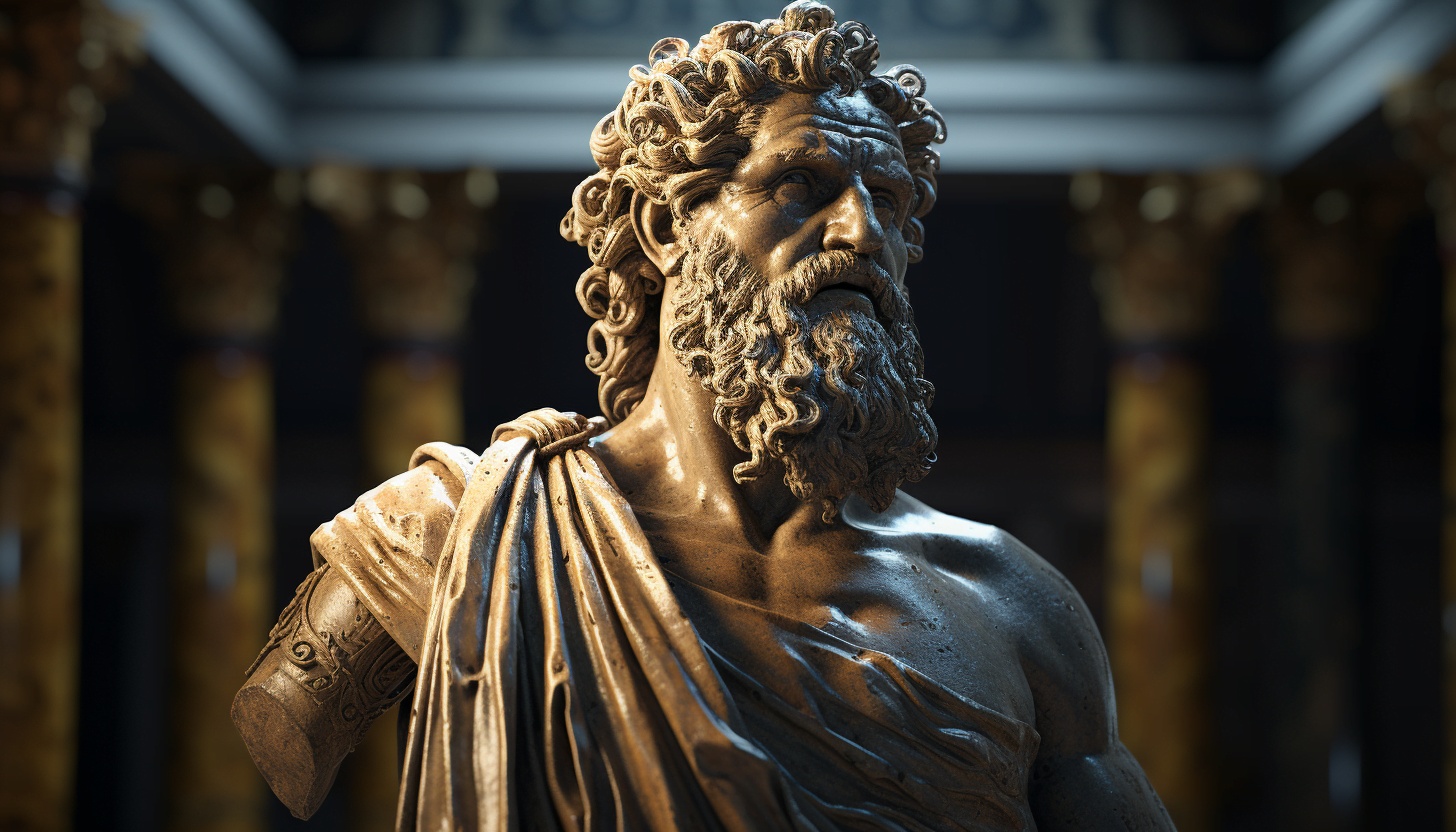Have you ever wondered about the profound teachings of Democritus, the ancient philosopher hailed as the father of atomic theory? Brace yourself for a fascinating journey through the philosophical realms of this enigmatic figure. In this article, we will delve deep into the life and works of Democritus, uncovering the mysteries behind his revolutionary atomist doctrine. But hold on tight, for the exploration doesn’t end there. We will also explore Democritus’ profound insights into the nature of the soul and living things. Get ready to be captivated by the captivating timeline of Democritus’ groundbreaking ideas and philosophical musings!
🔗 Explore Further: Democritus Atomic Theory
Dive deeper into Democritus’ profound insights on the fundamental nature of matter in our article: “Democritus Atomic Theory: Unraveling the Fundamental Nature of Matter.” Click the link above to unravel the secrets of his groundbreaking philosophy.
Timeline
Democritus, often hailed as the “laughing philosopher,” was a fascinating figure in ancient Greek philosophy. Born in Abdera around 460 BCE, his philosophical teachings continue to captivate scholars and thinkers to this day. Democritus lived during a time of great intellectual exploration, when Greek philosophy was blossoming and individuals were seeking to understand the nature of the universe and human existence.
Early Life and Influences
Democritus’s journey into the realm of philosophy began with his early education under the guidance of his father, who was a wealthy merchant. This affluence allowed Democritus to travel extensively, immersing himself in different cultures and engaging with renowned scholars of the time. This exposure broadened his understanding of the world and laid the foundation for his future philosophical inquiries.
Atomism: A Revolutionary Concept
One of the most profound and enduring concepts put forth by Democritus is atomism. In his view, the universe consisted of tiny, indivisible particles called atoms. These atoms, he believed, were in constant motion and combined to form everything we observe in the world around us. This theory challenged the prevailing belief of the time, which held that matter was infinitely divisible. Democritus’s atomistic philosophy offered a fresh perspective that laid the groundwork for scientific advancements in the centuries to come.
Ethics and Happiness
Democritus also emphasized the importance of ethics and how they contributed to human happiness. He believed that true happiness came from cultivating virtues and leading a virtuous life. According to him, virtues such as temperance, justice, and wisdom were essential for attaining a state of eudaimonia, or flourishing. Democritus explored the role of ethics in guiding human behavior and aligning individuals with a meaningful and fulfilling existence.
Legacy and Influence
Democritus’s philosophical teachings left a lasting impact on subsequent generations. His ideas on atomism and ethics influenced philosophers like Epicurus and laid the groundwork for modern scientific understandings of matter and the universe. Furthermore, his emphasis on human happiness and the pursuit of wisdom continues to resonate with individuals seeking personal growth and fulfillment in their lives.
In conclusion, Democritus’s philosophical teachings offer a profound exploration of various aspects of the human experience. From his groundbreaking concept of atomism to his ethical insights, his contributions continue to shape and inspire philosophical inquiry. By delving into his teachings, we can gain valuable insights into the nature of the world, human existence, and the pursuit of happiness.
“Through his revolutionary concepts and profound insights, Democritus invites us to ponder the fundamental nature of our existence and the path to genuine fulfillment.”
Life and Works
Democritus, the ancient Greek philosopher, left an indelible mark on the world of philosophy with his fascinating teachings. Born in Abdera, Greece, around 460 BCE, Democritus lived a remarkable life filled with exploration, observation, and profound thoughts. Throughout his works, he delved into numerous areas, including metaphysics, ethics, and natural philosophy, offering unique insights that continue to captivate readers even today.
One of the central ideas that Democritus explored was the concept of atoms. He posited that all matter consisted of tiny, indivisible particles that he called “atoms.” This groundbreaking notion, which proposed the existence of fundamental building blocks of the universe, laid the foundation for modern atomic theory. Democritus’s atomic theory was a cornerstone of science and philosophy, and it forever changed our understanding of the world.
In addition to his atomic theory, Democritus had much to say about the nature of reality and knowledge. He believed that reality was purely physical and material, rejecting the notion of a spiritual or metaphysical realm. His materialistic stance challenged the prevailing philosophical schools of thought in his time, setting him apart as a forward-thinking philosopher who questioned convention.
Democritus also delved into ethics, exploring the nature of good and evil. He believed that happiness, or eudaimonia, was the ultimate goal of human life but emphasized that it could only be achieved through moderation and self-control. According to his teachings, finding balance in life was crucial for leading a virtuous and content existence. Democritus’s moral philosophy continues to be a subject of study and debate, inspiring countless individuals to reflect on their own pursuit of happiness.
Beyond his philosophical works, Democritus’s interests extended to a wide range of topics, including mathematics, biology, and astronomy. He observed the world around him with keen eyes, making valuable contributions to various fields. Although much of his work has been lost to time, his influence on subsequent generations of philosophers and scientists cannot be overstated.
In conclusion, Democritus’s life and works offer a profound exploration of the philosophical landscape. His atomic theory, materialistic worldview, ethical teachings, and wide-ranging interests stand as a testament to his intellectual prowess and insatiable curiosity. As we delve into his fascinating philosophical teachings, we embark on a journey that challenges conventional wisdom, encourages critical thinking, and imparts timeless lessons. Democritus’s words and ideas continue to resonate, reminding us of the boundless potential of human thought and the power of intellectual curiosity.
“Just as it is impossible to cure someone who thinks that they are not sick, it is impossible to enlighten someone who thinks they already possess knowledge.”
2. Atomist Doctrine
The Atomist Doctrine, an essential concept in the philosophy of Democritus, presents a fascinating exploration of the universe. According to this doctrine, all matter in the world is composed of indivisible, indestructible particles called atoms. These atoms, varying in shape and size, combine and interact to form everything we know and perceive.
Imagine the universe as a vast puzzle, with countless atoms as its pieces. Democritus believed that the atoms, devoid of any inherent qualities, simply moved and collided in a void. It is through these interactions that the world, in its diverse and complex nature, emerges.
The Atomist Doctrine goes against the prevailing theories of its time, which suggested that matter could be infinitely divided. Democritus, through his philosophical teachings, challenged this idea and proposed that there exists a fundamental limit to division—that of the atom. This revolutionary concept laid the groundwork for modern atomic theory and scientific understanding.
To truly grasp the significance of the Atomist Doctrine, one must understand its key aspects:
- Atomistic Nature: The doctrine posits that the world is composed entirely of atoms, the building blocks of all matter. These atoms are constantly in motion, coming together and separating, creating the ever-changing reality we experience.
- Indestructibility: Atoms are indestructible; they cannot be created or destroyed. Instead, they transform and recombine to form new substances. This principle is beautifully captured by Democritus in his metaphor of a river. He compares the flow of atoms to the continuous flow of water, where no drop is ever truly lost.
- Diverse Arrangements: The Atomist Doctrine recognizes that atoms differ in size, shape, and arrangement. These differences determine the properties and characteristics of different substances. Just as the infinite combinations of letters form words, atoms combine to create the multitude of objects we encounter.
- Void and Motion: The Atomist Doctrine acknowledges the existence of the void, a space in which atoms move and interact. Without this void, motion would be impossible. Democritus compared the void to the canvas on which atoms can freely express their dance.
Democritus’s Atomist Doctrine presents a profound exploration of the nature of reality. By challenging prevailing beliefs and embracing the idea of atoms, Democritus laid the foundation for scientific inquiry and philosophical reasoning. As he aptly put it, “In reality, there exist only atoms and the void; everything else is merely opinion.” Through this doctrine, Democritus invites us to question the fundamental aspects of our existence and appreciate the intricate beauty of a universe composed of indivisible particles.
“The world is a dance of atoms, swirling and colliding, creating everything we perceive, from the smallest pebble to the brightest star.”
4. The Soul and the Nature of Living Things
The concept of the soul and its relationship to living things has intrigued philosophers for centuries. Among the many thinkers who have delved into this fascinating topic, Democritus is regarded as a profound explorer. His philosophical teachings shed light on the intricate connection between the soul and the nature of living things, revealing insights that continue to influence our understanding today.
Democritus, a prominent Greek philosopher who lived around the 5th century BC, believed that the soul existed in all living beings. According to his teachings, the soul was an essential element that animated and governed the body. It was the source of life, consciousness, and thought, endowing living beings with their unique qualities and characteristics.
In Democritus’ view, the soul was not immutable but rather a dynamic and evolving entity. He proposed that the soul was composed of tiny, indivisible particles he called “atoms.” These atoms were in a constant state of motion and rearrangement, providing the basis for the ever-changing nature of the soul. This notion of the soul as an ever-fluctuating entity challenged the prevailing belief in a fixed and unchanging soul.
Drawing parallels between the soul and nature, Democritus argued that just as the natural world is governed by universal principles, the soul is also subject to its own laws. He suggested that the soul was intricately connected to the physical body and influenced by external factors, such as the environment and experiences. This holistic perspective emphasized the interplay between the inner self and the external world.
Democritus’ teachings on the soul also explored its relationship to emotions and desires. He posited that these aspects of the soul were not arbitrary but deeply rooted in biological processes. For example, he believed that emotions were the result of certain atomic configurations within the soul. By understanding the underlying mechanisms of these experiences, Democritus aimed to promote self-awareness and self-control.
In contemplating the soul and the nature of living things, Democritus encouraged a profound exploration of the self and the world. His teachings remind us that the soul is not a detached and transcendent entity, but rather an integral part of our existence. Examining the soul through the lens of Democritus’ philosophy allows us to grasp the intricacies of our consciousness and the profound connection between our inner selves and the external world.
As Democritus eloquently put it, “The soul is a dynamic mosaic, composed of ever-moving atoms, shaping our thoughts, emotions, and understanding of the world.” Through his profound exploration, we gain a deeper appreciation for the soul’s role in the nature of living things and the intricate tapestry of our existence.
“The soul is a dynamic mosaic, composed of ever-moving atoms, shaping our thoughts, emotions, and understanding of the world.”
The Philosophy of Democritus and the Atomists
[youtube v=”AAng_mvJrDo”]
Among the Pre-Socratic philosophers, Democritus stands out as a philosopher of immense knowledge and logical thinking. Despite the fact that we only know him through the writings of others, particularly Aristotle, Democritus has made a lasting impact on philosophy.
Democritus was born in the northern Greek territory of Thrace around 460 B.C.E. Initially, his philosophy was ignored by the scholars of Athens. However, around 420 B.C.E, his philosophic prestige reached its peak and he gained recognition throughout the ancient world.
Democritus is said to have authored around 70 works, covering a wide range of topics such as philosophy, painting, and even farming. However, it is his atomic theory of matter for which he is most remembered. This theory proposed that all aspects of life, including ethics and morals, could be explained through atoms.
The atomist school, which Democritus is associated with, sought to reconcile the conflicting ideas of monism and pluralism proposed by Parmenides and Empedocles. It is important to note that the atomists were uncompromising determinists who denied the existence of chance.
According to Democritus, the universe is composed of two fundamental entities: atoms and the void. Atoms are eternal, impenetrable, and too small to be perceived by the human eye. They come in various shapes and continuously move, occasionally interlocking to form vortices. These vortices give rise to the various phenomena that populate the universe.
The atoms themselves are eternal, while the phenomena they create continually change and rearrange. The atoms require something in which to move, which the atomists refer to as the infinite void. This void is not the absence of something, but rather a real space through which atoms perpetually move.
Democritus compared the void to motes floating in a sunbeam when there is no wind. All sensations are the result of the interaction between external atoms and the atoms present in our sensory organs.
Aristotle raised a question regarding the atomic theory: how can the initial motions of the atoms be explained if all phenomena are simply the result of antecedents? The atomists, however, rejected the notion of purpose or final cause in explaining the world. They believed that purpose only applies within reality, rather than to reality as a whole.
Democritus rejected popular religion and viewed the gods as a way for the masses to find comfort and explain the inexplicable. He believed that the universe has always existed and continues without direction or mindful purpose.
According to Democritus, the aim of life should be the pursuit of pleasure and cheerfulness, sought with moderation. He advocated for freedom from fear and superstition, which leads to ultimate tranquility. Democritus also rejected violence and intense passion, stating that friendship holds greater value.
The atomists’ mechanistic approach to questions and answers was groundbreaking for its time. While their theories were not more empirical than other theories during antiquity, their influence was profound. Scholars such as Aristotle, Epicurus, Montaigne, and Spinoza drew inspiration from the atomists’ work.
In conclusion, Democritus and the atomists made significant contributions to philosophy with their atomic theory of matter. Their belief in determinism, rejection of purpose, and focus on pleasure and tranquility continue to resonate with philosophers to this day.
FAQ
Question 1: What are the life and works of Democritus?
Answer 1: Democritus was an ancient Greek philosopher who lived from 460 BC to 370 BC. He is best known for his atomic theory of the universe and his philosophical teachings on the nature of reality. Democritus wrote more than 70 works, covering a wide range of topics including ethics, physics, mathematics, and cosmology.
Question 2: What is the Atomist doctrine?
Answer 2: The Atomist doctrine was the philosophical theory developed by Democritus and his mentor Leucippus. According to this doctrine, all matter is composed of tiny, indivisible particles called atoms. These atoms are eternal, indivisible, and infinite in number. They are constantly moving and combining to form different objects and substances in the universe.
Question 3: What were Democritus’ views on the soul?
Answer 3: Democritus believed that the soul is made up of atoms, just like the rest of the universe. He considered the soul to be a highly refined and subtle form of matter. According to Democritus, the soul is responsible for our consciousness, thoughts, and emotions. He also believed that the soul is mortal and ceases to exist after death.
Question 4: What did Democritus say about the nature of living things?
Answer 4: Democritus viewed living things as complex arrangements of atoms and void. He believed that all living organisms are composed of various combinations and configurations of atoms. According to Democritus, the differences between living and non-living matter arise from the different arrangements of atoms and the types of atoms involved.
Question 5: What is the significance of Democritus’ philosophical teachings?
Answer 5: Democritus’ philosophical teachings laid the foundation for modern atomic theory and our understanding of the nature of matter. His ideas on atoms and the void influenced later philosophers and scientists, including Epicurus and Isaac Newton. Democritus’ emphasis on the materialistic and atomistic view of the universe challenged prevailing religious and metaphysical beliefs, paving the way for a more scientific and rationalistic approach to understanding the world.
- Sept 31 Myth: Unveiling Calendar Secrets - March 18, 2025
- How Long & Till December 18, 2025: Accurate Countdown Guide - March 18, 2025
- Discover Japanese Artists: A Complete History - March 18, 2025
















